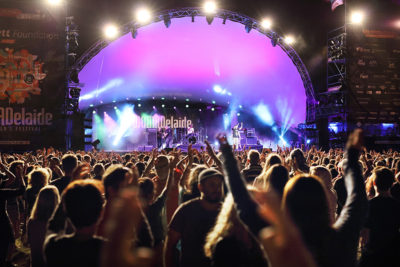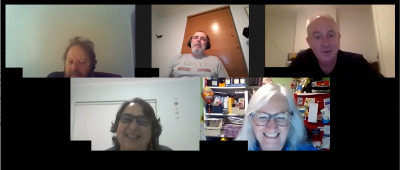Why culture is paramount to a flourishing city
For nearly two decades, Square Holes has been working extensively in the arts and cultural sector supporting government departments and cultural institutions to shape the way forward for arts and culture in South Australia, and abroad.
Part of this work includes engaging with a number of cultural institutions across the state in the capacity of sponsorships with a view to building a stronger cultural economy and influence. This includes past and present partnerships with the Adelaide Film Festival, Helpmann Academy, State Theatre of South Australia, Zoos SA, and _SOUTHSTART. Our work has aided these organisations to change strategic direction when need be, quantify their economic and cultural impact to their many stakeholders, and community test new initiatives or public offerings.
“It takes many stakeholders to deliver a festival and I think it’s really important to provide that data to those stakeholders. So, we help use that feedback to guide our next steps and adjust how we do things but also reinforce and reaffirm activities that we are doing. And reassure our partners too,” Mat Kesting, AFF Creative Director.
We have also worked extensively with government departments like the Department of Premier and Cabinet and Music Development Office on campaign development, testing and monitoring, and industry health checks in order to direct future strategy and funding.
“It’s been useful to understand the critical metrics that have resulted from our efforts, and to be able to use those to guide those paths forward. Without feedback and without, more importantly, the analysis of that feedback, we would not have been able to evolve our brand, experiences and the service offerings that sit within it,” Danielle Seymour, Director at _SOUTHSTART.
And with mid-sized and large organisations such as The David Roche Foundation, State Opera of South Australia, Adelaide Oval, History Trust of South Australia and the Art Gallery of South Australia (to name just a few) to seek new audiences, substantiate their value to stakeholders and stake out new strategic directions.
“The Square Holes research really enabled us to articulate our value using some really great statistics about who’s received funding, who’s employed, who started their own business and the effects on their confidence that the support they’ve received from us and had. It’s just invaluable,” Olivia Power, Helpmann Academy.
Through our work and engagement with the cultural sector we have observed the fragility of the ecosystem as it stands in the wake of the pandemic, while admiring the resilience of creatives and arts workers fighting to build a more buoyant framework moving forward. Below we share three key insights from our ongoing research:
Arts and culture value doesn’t sit solely in it’s economic potential
The advent of covid-19 really shined a spotlight on two key factors in the arts industry – how fragile our local ecosystem is and how vital the arts are to a community grappling with a world crisis. As people turned to film and television, music, books, art and podcasts to escape from and contextualise that moment in time, artists and art workers were suddenly faced with closed venues, closed borders and no income. Mental health and resilience became industry hot topics as creatives struggled to quantify the “necessity” of the job they do.
“I still don’t think, even in an arts city like Adelaide, that most people understand the value and the contribution of the arts. I don’t even think in government leadership they get how absolutely vital it is. It’s not seen as a commercial asset, which I think is interesting,” says Jason Dunstone, Managing Director, Square Holes.
So much onus is placed on the economic outcomes of the arts/cultural industry (which the numbers indicate is substantial), but what could we gain if that emphasis skewed more on the cultural value? So much of Adelaide’s identity is steeped in our cultural assets, but without the continued and longterm investment in our grassroots talent and emerging creatives, and a concerted effort on behalf of the government in explaining that cultural role, our state faces the risk of losing our best and brightest to other states.
“It’s almost like understanding that role, almost understanding what is the cultural value of the arts and cultural space, not just the economic. It’s about government and the leadership side of why does this matter so much in that cultural content? What is the case we’re putting forward of why funding is required or why it matters so much?” says Dunstone.
Australia needs to be better at supporting our artists while they are still here
In a recent blistering speech made at BIGSOUND, lead singer of Camp Cope and solo artist Georgia Maq touched on the very real issue of “tall poppy syndrome” in Australian music, where we don’t support our local artists until they recieve recognition or fame abroad.
In her speech she stated, “Why don’t we care about and support our artists until the rest of the world takes notice of them? Why don’t we back them until we have to? It’s not the Australian way, I suppose. We are guilty of cutting down our own, like tall poppies, something that is so unique to only us. I’ve learned the best thing you can do as a musician in Australia, at this point, is to leave… This will keep happening until we change, until it’s possible for us to have a career and live off our art in Australia.”
Many of us are guilty of saving our money for big ticket acts from overseas and for waiting until our own artists have received international acclaim before we jump on the bandwagon. But how then do we demonstrate to our up-and-coming creatives that South Australia is a worthy place to build their career?
“How you get the talented emerging artists to see that there’s value and merit to being an artist is a really tough one. How do you actually even get to that point where you want to give it enough of a crack to have any emphasis? I think it’s just not valued in the community, so therefore the government doesn’t support it as a priority, so it’s a hard one for an emerging artist to even just double down and actually make a contribution to it,” says Dunstone.
“I think in Australia we can be not open-minded enough sometimes to want to explore things that aren’t proven… So we are not willing to support someone who is doing something a little bit different until they have been given the stamp of approval by bigger demographics like the US or the UK.”
The arts is an ecosystem
This one may seems obvious, but while sometimes the arts can feel like a competition, in fact it is a very delicate ecosystem where if one part is struggling, the whole sector feels it. Which is why community and government support is so paramount so that our state doesn’t lose vital players within that system.
“How do you create that creative industry’s ecosystem to allow talented people to flourish rather than thinking that the arts isn’t a viable career choice? I believe all of that comes down to what a flourishing city is about. Not just saying it’s only about jobs in STEM, because that’s not a critical thinking, endless possibilities society. That’s a society with very restricted views about what is valid and what we’re going to create for the future,” says Dunstone.
If as a community we work to built arts and culture at the centre of our state, all other sectors benefit as well.
“Adelaide with a city of 1 million people, how do you thrive as an artist? And if there’s not that local ecosystem to have people supporting, it can feel like everything’s sacked against an artist to survive. In South Australia or broader Australia, we’re not always valuing that this is a contributor, this is a critical part of any kind of buoyant society or culture. This is what we need,” says Dunstone.
“This is actually a thing that shapes our society in the next 10, 20 years.”




